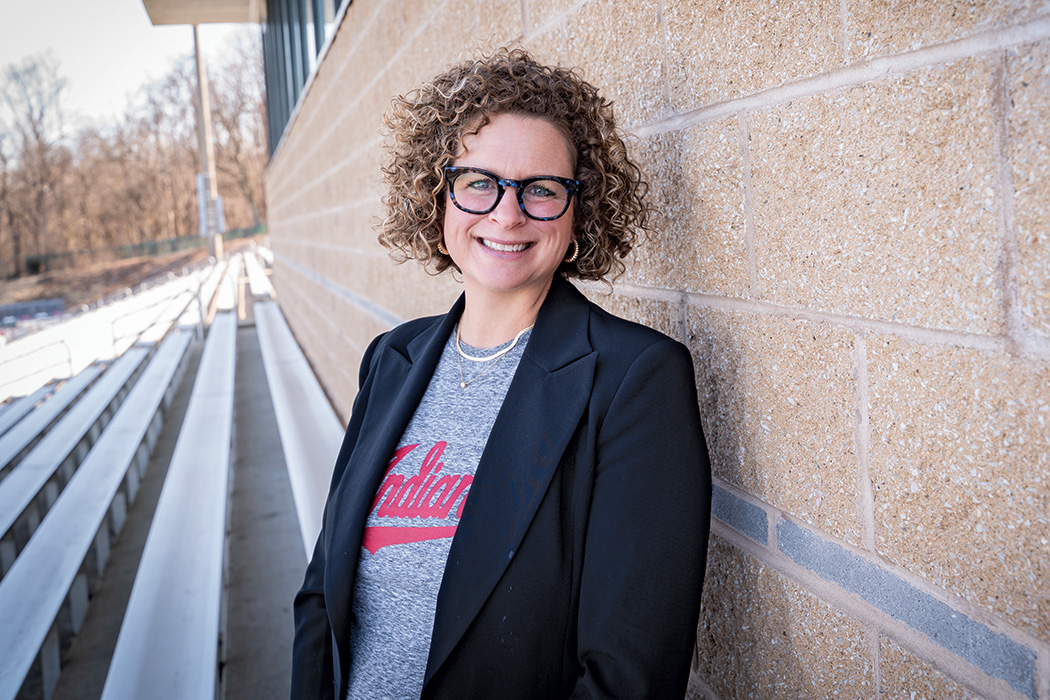Katy O’Brian Shares Her Acting Secrets

Bartender. Cashier. Zombie. Comms officer. Cop. Katy O’Brian, BA’11, is the definition of a versatile actor.
But it’s taken her years and countless auditions to establish herself in the film/TV industry. O’Brian shares all—and we mean all—her insider secrets in the following Q&A.
Breaking into Hollywood
Where should you live in Los Angeles if you want to be an actor?
Katy O’Brian: The good thing about self-tapes is that you don’t have to live in Los Angeles to act. If you must move to LA, just know that it’s expensive. The studios and casting offices are spread out all over the city and when filming on location, you could wind up anywhere. Most actors live in Burbank, Studio City, or East Hollywood for the perks of being fairly close to most studios. A lot of acting classes will be in those areas too.

Do you recommend that people take acting classes in LA? If so, where?
KO: Acting classes are a great way to get the practice of performing in front of others. They help build community and connections and great teachers can help fine-tune performances. I’ve trained at John Rosenfeld Studios and Billy O’Leary Acting Studios. I would recommend auditing as many classes as you can to see which vibe feels right for you.
How do actors typically network in LA?
KO: Student films are a wonderful way to network. Screen Actors Guild-American Federation of Television and Radio Artists (SAG-AFTRA) also offers networking opportunities for its members. Of course, being on set is a great way to network. Even working background gigs can help you meet people who work at all levels of the industry.

Do you recommend working as a background actor?
KO: It’s a great way to learn how a set operates if you have never been on one before, and some people can make a career out of it. Getting into SAG-AFTRA is very difficult. Collecting background vouchers is still one of the most common ways to get into the union. [Background work] can be a tough gig. It’s a lot of tedious work, and background is often overlooked.
Do you need an agent? Do you need a manager? If yes, how do you get either with no credits?
KO: Yes. [Acting] is insanely challenging otherwise. I have both. I’m grateful for both, but that means 20 percent of my paycheck goes to commission. Agents take 10 percent, managers take 10–15 percent (some take 20 percent, which is a lot in my opinion). Agents submit you for jobs, negotiate your contracts, and build relationships with casting directors, directors, and producers. Managers help guide your career as well as try to introduce you to industry professionals (they can also help you find an agent). Managers also submit you for jobs, but in LA, a manager cannot legally negotiate contracts, so you will either need an agent to do so or a lawyer (lawyers usually commission five percent).

The only way to get representation with no credits is to either get lucky or know someone. I strongly recommend building credits on your own first. There are plenty of student films and other productions that actors can submit [themselves] to on various casting websites, such as L.A. Casting, Casting Networks, Actors Access, and Cast It Talent.
Another way to go is the commercial route. Agencies usually have several branches—commercial, theatrical, voice-over, literary, etc. There are a lot more non-union commercials than union ones, so commercial agents are more likely to sign talent with fewer credits, especially if they take commercial or improv classes. Once you sign with a commercial agent, you are more likely to get a meeting with their theatrical department (the ones who work with film and TV). It’s not a guarantee, but it’s helpful.
What is a showcase? Did you ever attend one?
KO: Sometimes you can find showcases with casting directors or agents where you prepare material (usually a scene) and have an opportunity to perform in front of a handful of professionals. I’ve done one agency showcase. It was fun, I learned a little, got some feedback, and even had an agent request I contact her after. I know many casting directors who love using showcases as opportunities to call actors in for auditions. Just keep in mind, it should never feel like you’re paying to audition. If there’s a fee, there must be a learning component attached.
Nailing the Audition
What are your tips for a self-tape audition?
KO: First, practice performing on camera in a close-up range. You might be surprised how little you need to move to get your point across and how ridiculous you look if you’re moving a lot. If they ask for a wider shot (waist up), you might want to move a little more so as to not appear stiff.

Good lighting, good sound, a good camera, and a good reader are essential. I do my best to tape during the daytime with natural light because it makes the lighting process effortless. Ideally, you should be able to clearly see the color of your eyes and have a plain background that contrasts with your skin and clothes. Blue, gray, and tan backgrounds are pretty popular these days, but since I have tan skin, I practically blend in with a tan background. I also avoid white [backgrounds]. It tends to wash everything out.
If you can read with another actor, that’s great. Their performance can fuel yours, and if they’re good, they’ll note when you’re not in focus or in a weird position while recording. The reader should never be louder than you or take away from your audition.
It’s easy to get spoiled with self-tapes because you can do them anywhere, anytime, and as many times as you want, but I recommend preparing self-tapes as you would an in-person [audition]. Try to get your best performance on your first or second take. Also, it’s self-explanatory, but read the directions casting provides and follow them exactly.
What are your tips for performing well at an in-person audition?
KO:
1. Prepare. Prepare. Prepare. Know your lines. Know your character. Know how you fit into the scene and your purpose. Practice while sitting, standing, moving, doing complicated tasks, etc. The better you know your lines under a variety of conditions, the less stressed you’ll be on the day [of the audition], and the more prepared you’ll be if they throw something new at you.
2. Bring your sides with you, just in case, and practice referencing them.
3. Don’t let other actors in the waiting room distract you. If you can hear the person going before you, don’t let their audition impact your choices.
4. Minimize props. Never bring a weapon into an audition room—even if it’s fake.
5. Be polite and personable but concise. Don’t take up their time with too much chatter or too many redos.
6. Be honest. If there’s something you can’t or won’t do, don’t say you can or will do it.
Do you have any tips for memorizing pages of dialogue?
KO: [My Los Angeles acting coach] Billy O’Leary has several great methods for memorization. One of the biggest takeaways for me was to read each line word for word several times before attempting to memorize anything. When you start memorizing before you’re ready, you’ll sometimes switch words or fill in words incorrectly.

Next, I try to figure out if there is anything I need to be more familiar with. Adding context always helps your brain make connections to the words. I’m not a sci-fi person but I always wind up in sci-fi shows, so I find myself googling all kinds of jargon—neutrino anomalies, fighter squadrons, neutronium—and it helps me understand what I’m actually talking about. If you’re talking to someone else in the scene, you should probably know what they’re talking about, too.
I used to have to write my dialogue down. Some people benefit from writing the first letter of each word down, including all punctuation. [For example,] “Department of Analytical Research” becomes easier to remember as the acronym: DoAR.
Finally, I practice the lines often, especially with a reader. If I don’t have a reader, I use an app called Scene Study. I find that practicing in a variety of ways—random accents, different pacing, etc.—helps. If I start to fumble a lot, as the brain does when it’s tired, I stop, rest, go for a walk, and then start practicing again when I’m refreshed. If you continue to practice your lines when you’ve reached fatigue, you’ll psych yourself out.
Tags from the story
Written By
Samantha Stutsman
Samantha Stutsman, BAJ'14, is a Bloomington, Ind., native and a senior content specialist at the IU Alumni Association.



